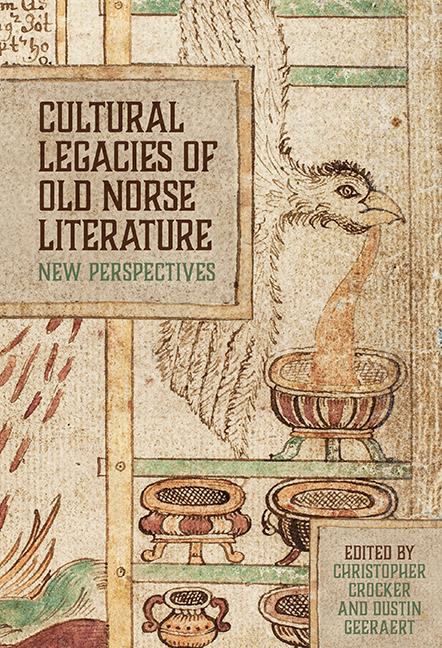Book contents
- Frontmatter
- Contents
- List of Illustrations
- List of Contributors
- Foreword: Old Norse and the Porous Boundaries of Medievalism
- Acknowledgements
- Note on the Text
- Introduction
- 1 Dr Jekyll and Mr Hyde in Medieval Iceland: Saga Realism and the Sworn Brothers
- 2 The Malleability of the Past: Íslendingabók as Narrative History
- 3 Women’s Work and Material Culture in Medieval Iceland: Gender, Narrative, and Cloth Production
- 4 Vafþrúðnismál, from Parchment to Print: Stability and Change in the Transmission of Eddic Poetry
- 5 The Odinic Motif: The Wanderer in the Mist
- 6 What has Darwin to do with Óðinn? Shapeshifting, God, and Nature in the ‘Great Story of the North’
- 7 Madness, Mythology, and Mitteleuropa: Günter Grass’s Transformation of Old Norse Myth in The Tin Drum
- 8 Once More, with Fiction: Transforming Myth in Gerður Kristný’s Blóðhófnir and the Eddic Poem Skírnismál
- Afterword: Ethnographic Medievalisms
- Bibliography
- Index
Foreword: Old Norse and the Porous Boundaries of Medievalism
Published online by Cambridge University Press: 08 October 2022
- Frontmatter
- Contents
- List of Illustrations
- List of Contributors
- Foreword: Old Norse and the Porous Boundaries of Medievalism
- Acknowledgements
- Note on the Text
- Introduction
- 1 Dr Jekyll and Mr Hyde in Medieval Iceland: Saga Realism and the Sworn Brothers
- 2 The Malleability of the Past: Íslendingabók as Narrative History
- 3 Women’s Work and Material Culture in Medieval Iceland: Gender, Narrative, and Cloth Production
- 4 Vafþrúðnismál, from Parchment to Print: Stability and Change in the Transmission of Eddic Poetry
- 5 The Odinic Motif: The Wanderer in the Mist
- 6 What has Darwin to do with Óðinn? Shapeshifting, God, and Nature in the ‘Great Story of the North’
- 7 Madness, Mythology, and Mitteleuropa: Günter Grass’s Transformation of Old Norse Myth in The Tin Drum
- 8 Once More, with Fiction: Transforming Myth in Gerður Kristný’s Blóðhófnir and the Eddic Poem Skírnismál
- Afterword: Ethnographic Medievalisms
- Bibliography
- Index
Summary
The dominant ideology of the modern world is that of progress: most obviously, scientific and technological, but also economic (the quest for growth), and politico-cultural (the use of legislation to improve society and alter cultural attitudes for the better). In these circumstances, it is natural that the past should be regarded as inferior, and in particular the medieval past. ‘Medieval’ is routinely used in pejorative senses. Often quoted is the remark in the 1994 movie Pulp Fiction, ‘I’m gonna get medieval on yo’ ass’: it means, ‘I am going to use torture’. One could cite also the old and bitterly satirical song by Tom Lehrer, ‘In the land of the boll-weevil / Where the laws are medieval’: i.e., cruel and savage.
Yet at the same time, the medieval world retains a powerful attraction, as seen in several recent successful TV series: George Martin's Game of Thrones, with its knights and contending dynasties in a world one might call ‘high medieval’; Vikings, which gives a much-foreshortened picture of an era stretching from the eighth to the eleventh centuries; and The Last Kingdom, based on the novels of Bernard Cornwell and more firmly set in the late ninth and early tenth centuries. One could argue that the attraction of such series stems indeed from their regressive cruelty, much more stimulating than peace and tranquillity. But the medieval world has also had powerful defenders, who point out that in the past century the modern world has had nothing to boast of as regards civilised behaviour. T.H. White's indignant outburst in The Once and Future King – ‘The Dark and Middle Ages! The Nineteenth Century had an impudent way with its labels’ – is extended to the twentieth century by C.S. Lewis's diabolical narrator Screwtape, who gloats over the way the achievements of the Enlightenment have been reversed. In political terms, the medieval has also again and again been used as a source of legitimacy, deliberately invoked by nation-builders in earlier centuries, and by separatist and irredentist movements up to the present day: this particular danger remains one for the future as well.
- Type
- Chapter
- Information
- Cultural Legacies of Old Norse LiteratureNew Perspectives, pp. xi - xiiiPublisher: Boydell & BrewerPrint publication year: 2022



